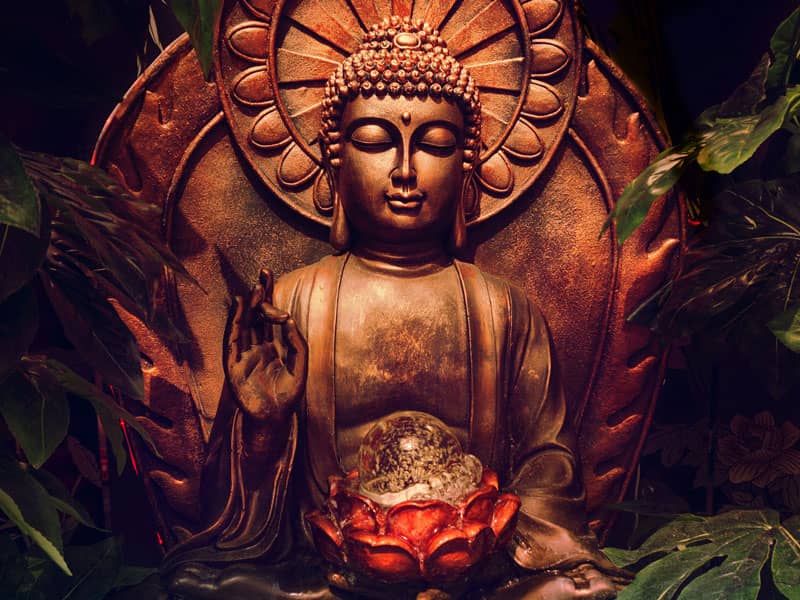Lama Surya Das and I were supposed to go to Nepal to visit Surya's Tibetan gurus. Surya's a fun guy and a pal; besides, he knows Kathmandu inside out, knows a million gurus, so it was going to be a great trip. I had never been to Nepal, hardly ever to Asia (just one trip to Japan, which is like going to New York, except you can't read the signs).
But Surya got sick at the last minute and couldn't make it. Arrangements were already made so I was going to Nepal by myself and I was a little apprehensive. There were no plans, no one there to receive me, and you can't drink the water. But it was too late to change, so off I went to exotic Nepal.
It is a very long flight to India. You arrive in an altered state. Day has turned into night and night into day, the body has become confused and the mind even more confused. The stomach is very confused. And it is confusing too not to know where you are or where you are going, confusing when your surroundings are strange, people look strange, your expectations are off, confusing when people speak and you can't understand, and when you can't make yourself understood, even in the most trivial things. It all adds up to a eerily delirious sense of the world and of self. You lose your moorings.

| ||
| I was in Kathmandu and ought to be doing something or other no doubt. I couldn't just sit there in the hotel lobby indefinitely. But that was all, apparently, I was capable of. | ||
 |
That's what happened to me. I arrived in some huge hotel Surya had booked for us and I really didn't know what to do with myself, whether it was morning or night, whether I was hungry or not, where to go or what do to. I remember sitting in the lobby confusing myself with the many guidebooks I had.
I was in Kathmandu and ought to be doing something or other no doubt. I couldn't just sit there in the hotel lobby indefinitely, as I seemed to be doing. But that was all, apparently, I was capable of. I actually couldn't figure out how to get out of there, so I just sat there waiting for something to come to me but nothing did. So I sat and sat realizing that it was really true what the Buddha had said: The mind is subject to conditions.
Whether you are a genius or an idiot, a thief or, like me, a Zen priest who has cultivated the mind for 30 years--the mind anyway is subject to conditions.
I marveled at this fact and was considerably humbled by it. Then I went upstairs to my very Western hotel room and watched the cable television channels for quite a long time: maybe a day or two, I don't know. There were some marvelous things on, old obscure American television programs I hadn't seem for a long time, if ever. Stuff like "Barnaby Jones" and "Ironside," stuff that isn't on even the most obscure cable channels in America, as far as I know. It was very soothing, and as soon as I gave up the thought that I was in Kathmandu, and realized that I was in television land, I was temporarily relieved.
When I got to the stupa, I fell into circumambulating it with all the pilgrims, saying [the Tibetan mantra of universal compassion] Om Mani Padme Hum on my beads as I always do. There were a few people along with me, mostly old folks, mostly Nepalese, not too many of them, but I hardly noticed them because almost immediately I hit a rhythm with the walking, and as soon as that rhythm was established something extraordinary happened: All my dis-ease and disorientation simply melted away--it just completely disappeared. I was walking around that stupa as if it were the only place in the world, as if this were the only moment of my life, and I felt a tremendous sense of happiness and well-being.
Far from being disgruntled and out of sorts in a world I never made and didn't know, I now felt as if I were swimming in the sea of perfection, in the midst of a world that I was made for and that had been made for me, my world, the only world, and that this was the only moment of every world. The sun was shining, the air was warm and caressing, even clinging, everyone seemed friendly and happy, and my body no longer felt heavy and fatigued: It was light as a snowflake, and like a snowflake it seemed to be swirling, rather than walking, around the great stupa.
But after about an hour or so of walking it occurred to me that this was actually not the great stupa of Swayambonath. Suddenly, something that the guidebook had said popped into my mind: Just below the actual stupa of Swyambonath there was a fake stupa, much smaller and less powerful, a replica of the real one, that had been built perhaps for old people, who were unable to climb the steep steps to the actual stupa. It was this fake stupa that I had been circumambulating; I could feel for certain that this was so.
So I went up the steep steps, dodging the monkeys, and saw the real stupa of Swyambonath. It was much larger, much more impressive, had many more pilgrims walking around it, and there were many smaller stupas and Buddha images all around it. So I circumambulated that stupa too for a long time. It was just as good.

